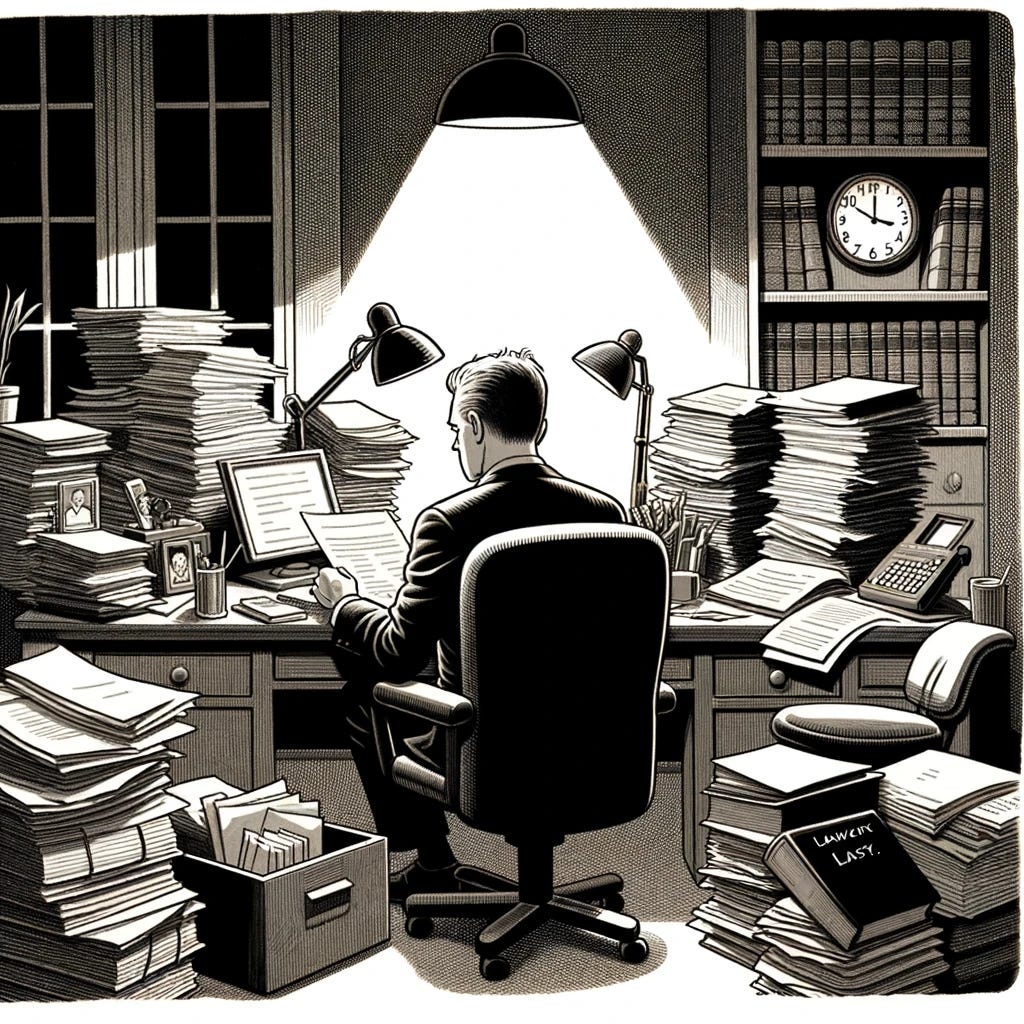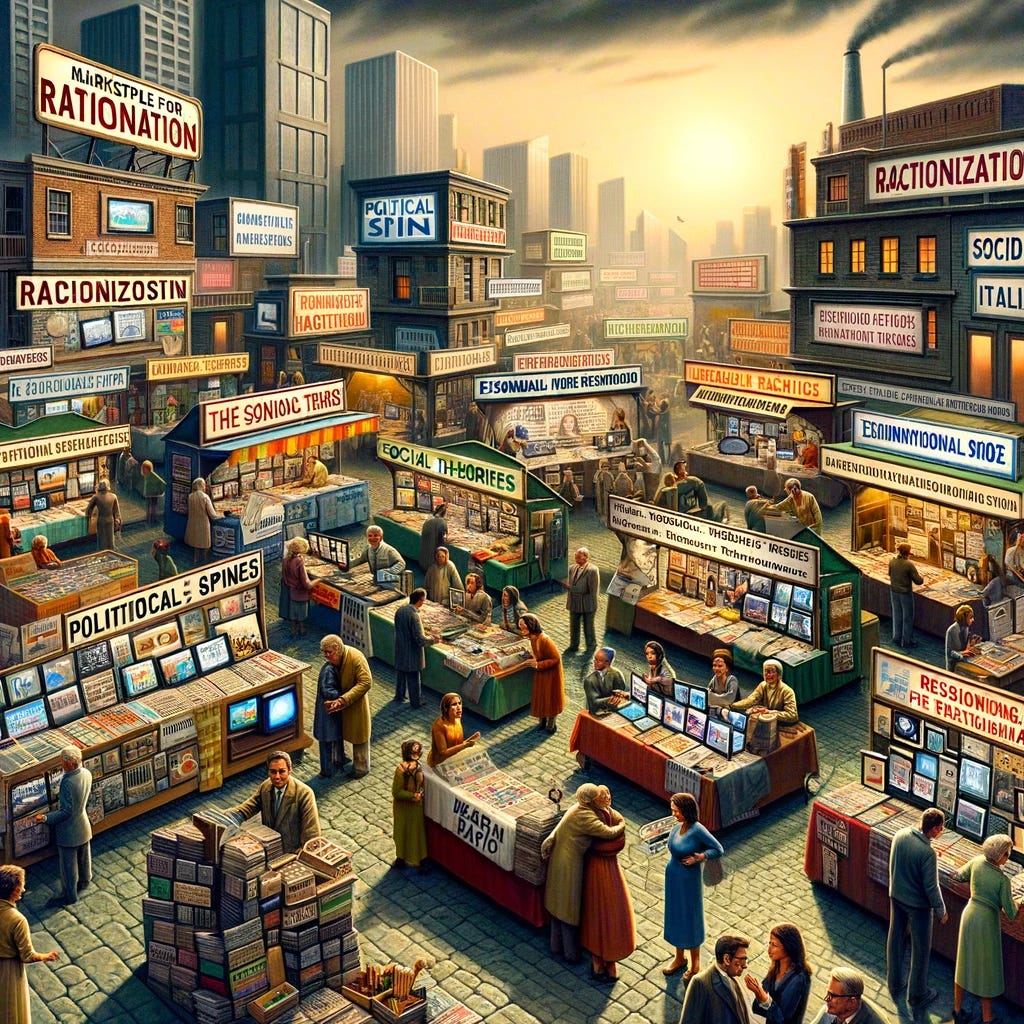The marketplace of rationalisations
If we were not buying it, they would not sell it
The public sphere, a social space where people can access and exchange ideas, is often seen as a key part of a well-functioning democracy. It helps citizens make informed decisions when deciding on which representative to elect and which policy to support (Habermas, 1962). Nowadays, there are plenty of concerns about how the public accesses and exchanges information. These range from worries about media bias to the emergence of echo chambers and the role of fake news. Manipulators are often accused of thwarting the proper functioning of democratic debates. But are ill-intentioned actors (who indeed exist) the main reason behind these issues? Perhaps it’s us, the consumers of news, and our preferences that shape the features of the modern public sphere.
A brief history of the public sphere and its discontent
Being better informed enables you to make better decisions. Information is therefore valuable, it has always been. People naturally look for information and exchange it with others. The first newspapers appeared in Venice in the 16th century, quickly gaining popularity across other European countries. In 17th century London, coffee houses spontaneously emerged as a primary source of news, alongside false rumours and seditious ideas. These mediums of exchange were not to the liking of rulers. Newspapers were often censored and in 1675, King Charles II attempted, albeit unsuccessfully, to shut down London’s coffee houses for having “produced very evil and dangerous effects.”
The 20th century witnessed the rise of mass media: daily newspapers printed in vast quantities, radio broadcasts, and television channels emerged as dominant forms of communication. This era marked a significant shift in information accessibility, fostering the vision of expansive democracies with well-informed citizens. However, mass media also presented potential avenues for influencing public opinion. Throughout the 20th century, numerous intellectual figures criticised mass media, accusing it of manipulating people. These critiques ranged from allegations of dumbing down the populace to promoting justifications for maintaining the status quo.

The 21st century saw an expansion in media types and numbers, with the advent of cable channels and the Internet. This diversification has resulted in a decentralization of the production of information content, potentially diminishing the importance of large media corporations. Where there was once a promise for a democratic public sphere, the internet seemed to be the technological solution able to deliver it. However, instead, the last two decades have seen a growing apprehension about people being divided into echo chambers where they are only exposed to slanted viewpoints, possibly fostering increased political polarisation in many countries.
The marketplace of rationalisations
The concerns about media influencing the opinions and beliefs of citizens, both large and small, may however be overblown. First, while the empirical evidence on media’s influence on political views has shown that they can indeed have some effect, the primary effect is likely not through changing people's beliefs. Rather, it is through “setting the agenda” of public discussions and placing a focus on themes that favour one political side or the other (Iyengar and Simon, 2000). Second, looking at the origin of media’s political bias, empirical studies have found that while “supply side” explanations—where biases are driven by the suppliers of news—play a role, media bias is in large part driven by the “demand side” (Gentzkow and Shapiro, 2010)—where biases are driven by the consumers of news.
But why is there a “demand side” effect? Why do people seek out confirmatory information that reinforces their existing views? A commonly proposed explanation is that people can derive “utility” (i.e., satisfaction)1 from their beliefs; they like to believe certain things (Gentzkow, Shapiro, and Stone, 2015). Therefore, when seeking information, they tend to select sources likely to affirm the beliefs they prefer.
Explaining behaviour by the satisfaction it provides is only a partial explanation. Why would satisfaction for biased beliefs exist in the first place?2 I addressed this question in my previous post, Why reason fails. It is likely that our reasoning ability was not selected to find the truth as a lone individual; instead, our reason was selected to convince others to side with us, trust us, and cooperate with us (Mercier and Sperber, 2017). While being convincing requires some degree of consistency with the rules of logic and the accessible evidence, it is not always served by having an impartial and unbiased logic.
It means that we typically think more like lawyers than scientists. Hence, when we think about a political issue, we look for confirmatory information because we are seeking evidence and arguments that we can mobilise in future discussions to give our position the upper hand. In short, we search for information in the same way lawyers prepare for a future case, studying books and previous cases with this specific goal in mind.
In that perspective, psychologist Hugo Mercier made an interesting point: our search for good arguments leads to the emergence of a market for justifications (Mercier, 2020). The demand for justifications provides incentives to other people to provide some. Building on this idea, philosopher Dan Williams (2022) discussed the existence and nature of a marketplace for rationalisations, “social structures in which agents compete to produce rationalizations in exchange for money and social rewards.” If a social group with similar beliefs and interests is large enough, it will create the opportunity for some other people to specialise in providing them with arguments and justifications conveniently aligned with their positions. Put another way, if you have enough “lawyers” looking to defend a position, there will be a market niche for research firms providing tailored information to them in favour of their cases.
A widespread demand for rationalizations creates an opportunity to profit from producing and selling them… As with other cases, such attempts at satisfying consumer demand should be viewed through the lens of competition: from the perspective of consumers, it is beneficial to shop around for the highest quality rationalizations provided at the lowest price, which means that producers will be able to sell their rationalizations only if they produce and sell rationalizations with these characteristics. - Williams (2022)
This perspective provides an enlightening view on the emergence of echo chambers on the internet. The decentralised nature of the internet has allowed for the creation of a more competitive market for rationalisations, where even people with fairly marginal views (e.g., flat earthers) can be numerous enough to support a small market niche. This niche can be profitable for certain rationalisation providers.
The old oligopoly of corporate media companies, often disparagingly labelled as “mainstream media,” now faces competition from millions of potential providers. These new entrants do their own research, post online videos and blog posts, and build online communities.
Williams rightfully notes that rationalisations, as a type of information, are non-physical goods. Once a seller mentions a rationalisation to an interested customer, that seller cannot take it back (unlike for instance a car that can be lent for a test drive and returned to the car dealer afterwards).3 Therefore, customers of rationalisations need to pay upfront for them. Another aspect of information is that its quality is known only after experiencing it. For example, I may tell you that I have a good argument for you to win your next debate, but you’ll only know if I was right after hearing that argument.
Hence, marketplaces for rationalisations are types of markets where customers need to pay before receiving the information they are looking for, but they only experience afterwards whether this information was worth paying for. Such markets naturally lead to consumers selecting providers based on their established reputation, which guarantees a certain level of quality. Hence, marketplaces for rationalisation are characterised by providers building a reputation for their propensity to deliver a specific type of content. This includes factors like political position, quality of factual and logical evidence, and level of technicality. Successful providers who attract a substantial number of people interested in their content can be rewarded either in terms of social prestige (e.g. number of followers, likes)4 or financially (e.g. advertising on Youtube, subscriptions on Substack).
Like on any market, providers do compete. Since price is typically low (and often zero for early starters), providers generally compete on quality: those able to provide more compelling stories and frame more interesting narratives are likely to attract more attention. A particularly valuable skill is the ability to make a compelling argument that can withstand counter-investigation. This creates a preference for arguments that are compelling yet truthful. “Rationalizations need not and often will not take the form of misinformation,” Williams (2023) notes.
Three new insights with this concept
The notion of a marketplace of rationalisations is enlightening to understand the dynamic between providers and consumers of political information. Expanding upon Dan Williams’ contribution, I will add three insights we can gain from market dynamics.
The first insight is that while providers of rationalisations compete against each other, there are likely agglomeration economies. Providers can benefit from being closely located (both in the political space and on providing platforms). Since the marginal cost of consuming content from an additional provider is fairly low, a provider gains from having other providers with similar content on the same platform (e.g., Twitter or Substack). Close-by providers in a given political niche can enhance their quality through the exchange of ideas, building on each other’s contributions. They can also exchange signals of reputation (e.g., endorsements), thereby benefiting from each other's serendipitous flow of interested customers.
The second insight is that demand creates its own supply. If there is an unmet demand, there will be pressure for a supply to emerge and satisfy it. This fact somewhat counterbalances the concerns that some large institutions can fully control the public discourse in liberal democracies. Historically, there have been left-wing concerns about corporate media and, more recently, right-wing concerns about the silencing of conservative views. The logic of the marketplace of rationalisations suggests that if there is a mismatch between supply and demand for some time—for instance, if the supply side offers options not reflective of the array of opinions in the population—then there will be an opportunity for new entrants to capitalise on this mismatch. While suppressing alternative voices is possible in autocratic regimes, in democratic countries with fairly decentralised centres of power and low barriers to entry in the information market, it is challenging to prevent new entrants from establishing ideological market niches as new providers.
A third insight is that providers face the risk of audience capture. As demand creates an incentive for providers to adapt, the dynamics of content production can turn out to be different from providers simply having followers. Instead, it evolves into providers chasing the content that resonates most effectively with their audience. Providers who happen to find an audience to whom they appeal may discover that they can increase engagement and following by further tailoring their message to this audience's preferences. In a polarised political environment, this dynamic can lead some initially reasonable providers to progressively radicalise their content, as it proves more successful with the market niche they appeal to.
Conclusion
It is common to hear complaints about the quality of the discourse produced on large media platforms (e.g., 'the mainstream media are biased') and on decentralised social media (e.g., 'the rabbit hole of algorithms leading to echo chambers'). In these criticisms, it's tempting to solely blame external actors for the current state of affairs. From this viewpoint, society would function better if media providers were more responsible for the quality of the content they broadcast. However, the evidence on the demand side of partisan information offers a different perspective on this issue. If the information sphere is plagued by biased and partisan content, it is largely because we, the consumers, are driving the demand for it. As French humourist Coluche drily stated in the 1980s, “When you think about it, if we weren’t buying it, they wouldn’t sell it.”
This is the fourth post exploring the reasons why we have wrong beliefs. In the first post, I examined the strategic benefits of overconfidence. The second post focused on how we use reason to win arguments with others, and in the third one looked at our tendency to defend our group’s position against competing groups. In the final post of this series, I will discuss potential solutions to improve the way we form beliefs and engage in discussions, considering these limitations.
References
Adorno, T.W. and Horkheimer, M., 1944. Dialectic of enlightenment.
Debord, G., 1967. The society of the spectacle.
Gentzkow, M. and Shapiro, J.M., 2010. What drives media slant? Evidence from US daily newspapers. Econometrica, 78(1), pp.35-71.
Gentzkow, M., Shapiro, J.M. and Stone, D.F., 2015. Media bias in the marketplace: Theory. In Handbook of Media Economics (Vol. 1, pp. 623-645). North-Holland.
Habermas, J., 1962. The structural transformation of the public sphere: An inquiry into a category of bourgeois society. MIT Press.
Henrich, J. and Gil-White, F.J., 2001. The evolution of prestige: Freely conferred deference as a mechanism for enhancing the benefits of cultural transmission. Evolution and Human Behavior, 22(3), pp.165-196.
Herman, E.S. and Chomsky, N., 1988. Manufacturing consent: The political economy of the mass media.
Iyengar, S. and Simon, A.F., 2000. New perspectives and evidence on political communication and campaign effects. Annual review of psychology, 51(1), pp.149-169.
Marcuse, H., 1964. One-dimensional man: Studies in the ideology of advanced industrial society.
Mercier, H., 2020. Not born yesterday: The science of who we trust and what we believe. Princeton University Press.
Mercier, H. and Sperber, D., 2017. The enigma of reason. Harvard University Press.
Srinivasan, K., 2023. Paying Attention. Technical Report 2023. mimeo, University of Chicago.
Williams, D., 2023. The marketplace of rationalizations. Economics & Philosophy, 39(1), pp.99-123.
For the economist reader: I adopt a fully cardinal definition of utility in this context, which is hardly contentious in modern economic discourse (see this post for further details).
Explaining a behaviour by the satisfaction it generates is what biologists refer to as a proximate explanation, it provides a suggested mechanism (in this case, psychological) that induces the behaviour. In contrast, questioning why this mechanism exists (e.g., why there is utility for biased beliefs) delves into seeking an ultimate explanation.
In economic terms, this is non-rivalrous (meaning its consumption by some does not exclude others from also consuming it) and non-excludable (indicating that it's difficult to prevent access to those who haven’t paid for it).
Prestige is an aspect of social status that can provide strong incentives. For a general overview, see Henrich and Gil-White (2001), and for its specific application to social media, see Srinivasan (2023).









Do you get the sense that there is any chance a “non-partisan” or “non-biased” or “politically centered” media outlet could thrive in today’s media ecosystem? I’m thinking no.
Loved this article by the way.
I’ll throw out an observation. There are two main media biases for which media outlets operate – a principle/values based bias or a political bias. The more straight up ideological media outlets (thinking Reason for libertarians or The Nation for progressives) have a principle/values bias where their values are applied consistently, which means that they will grill politicians from both parties that stray from the publication's values.
Then there is the NY Times and the Fox New of the world, that don’t seem to apply consistent values, they apply consistent political bias instead. Bending values to favor one party or harm the other party.
Again, a lot of this is pressure from the demand side. And when a news organization (really, any organization for that matter) gets big enough where the profits matter and investors become involved, then the organizations become a victim of their own success and must concentrate more on satisfying customer demand rather than integrity of process.
This is a fantastic post and I need to think about it for a while. But one immediate reaction is that this situation cannot be an equilibrium; if people quite generally are buying rationalizations there has to be a market for exposing bias, for which demand will come from people betting on the future (in prediction markets specifically or financial assets, including insurance contracts, more broadly). The suppliers in this market have to think like scientists, not lawyers, and build a reputation for this.